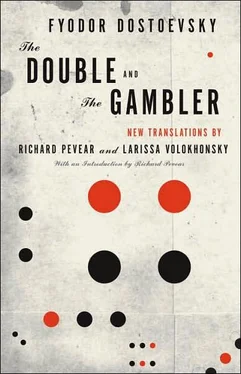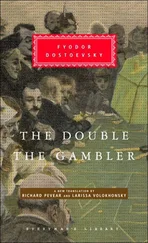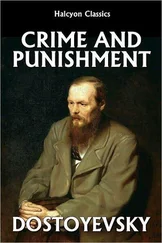Fyodor Dostoevsky - The Gambler
Здесь есть возможность читать онлайн «Fyodor Dostoevsky - The Gambler» весь текст электронной книги совершенно бесплатно (целиком полную версию без сокращений). В некоторых случаях можно слушать аудио, скачать через торрент в формате fb2 и присутствует краткое содержание. Жанр: Классическая проза, на английском языке. Описание произведения, (предисловие) а так же отзывы посетителей доступны на портале библиотеки ЛибКат.
- Название:The Gambler
- Автор:
- Жанр:
- Год:неизвестен
- ISBN:нет данных
- Рейтинг книги:4 / 5. Голосов: 1
-
Избранное:Добавить в избранное
- Отзывы:
-
Ваша оценка:
- 80
- 1
- 2
- 3
- 4
- 5
The Gambler: краткое содержание, описание и аннотация
Предлагаем к чтению аннотацию, описание, краткое содержание или предисловие (зависит от того, что написал сам автор книги «The Gambler»). Если вы не нашли необходимую информацию о книге — напишите в комментариях, мы постараемся отыскать её.
The Gambler — читать онлайн бесплатно полную книгу (весь текст) целиком
Ниже представлен текст книги, разбитый по страницам. Система сохранения места последней прочитанной страницы, позволяет с удобством читать онлайн бесплатно книгу «The Gambler», без необходимости каждый раз заново искать на чём Вы остановились. Поставьте закладку, и сможете в любой момент перейти на страницу, на которой закончили чтение.
Интервал:
Закладка:
CHAPTER VIII
ON THE PROMENADE, as they call it here, that is, the chestnut avenue, I met my Englishman.
“Oho!” he began when he saw me, “I’m going to you, and you to me. So you’ve already parted from your people?”
“Tell me, first of all, how you know about all this,” I asked in surprise. “Can it be that everybody knows all about it?”
“Oh, no, everybody does not know; and it’s better if they don’t. Nobody’s talking about it.”
“Then how do you know?”
“I know because I chanced to learn. Now where are you going to go from here? I like you, that’s why I was coming to see you.”
“You’re a nice man, Mr. Astley,” I said (though I was terribly struck: where did he find out?), “and since I haven’t had my coffee yet, and you probably did a poor job on yours, let’s go to the vauxhall café, sit there, have a smoke, and I’ll tell you everything, and…you’ll also tell me.”
The café was a hundred paces away. Coffee was brought, we sat down, I lit a cigarette, Mr. Astley didn’t light anything and, fixing his eyes on me, prepared to listen.
“I’m not going to go anywhere, I’m staying here,” I began.
“I was just sure you’d stay,” Mr. Astley said approvingly.
On my way to see Mr. Astley, I had had no intention and even purposely did not want to tell him anything about my love for Polina. In all those days I had scarcely said a single word to him about it. Besides, he was very shy. I had noticed from the first that Polina had made a great impression on him, but he never mentioned her name. But, strangely, suddenly, now, as soon as he sat down and fixed me with his intent, tinny gaze, an urge came over me, I don’t know why, to tell him everything, that is, all my love and with all its nuances. I spent a whole half-hour telling him, and I found it extremely pleasant to be telling about it for the first time! Noticing that in some especially ardent places he became embarrassed, I deliberately increased the ardor of my story. One thing I regret: I may have said some unnecessary things about the Frenchman…
Mr. Astley listened, sitting opposite me, without moving, without uttering a word or a sound, and looking me in the eye; but when I started speaking of the Frenchman, he suddenly cut me short and asked sternly whether I had the right to mention this extraneous circumstance. Mr. Astley always put his questions in a very strange way.
“You’re right: I’m afraid I don’t,” I replied.
“You can say nothing precise about this marquis and Miss Polina, apart from mere surmises?”
Again I was surprised at such a categorical question from such a shy man as Mr. Astley.
“No, nothing precise,” I replied, “of course not.”
“If so, you have done a wrong thing not only in talking about it with me, but even in thinking about it to yourself.”
“All right, all right! I acknowledge it; but that’s not the point now,” I interrupted, surprised in myself. Here I told him the whole of yesterday’s story in all its details, Polina’s escapade, my adventure with the baron, my dismissal, the general’s extraordinary cowardice, and finally I gave him a detailed account of today’s visit from des Grieux, with all its nuances; in conclusion, I showed him the note.
“What do you make of it?” I asked. “I was precisely coming to learn your thoughts. As for me, I think I could kill that little Frenchman, and maybe I will.”
“And I, too,” said Mr. Astley. “As for Miss Polina…you know, we enter into relations even with people we hate, if necessity demands it of us. Here there may be relations unknown to you, which depend on extraneous circumstances. I think you can rest easy—in part, to be sure. As for her action yesterday, it is, of course, strange—not because she wanted to get rid of you and sent you under the baron’s stick (which he didn’t use, though I don’t understand why, since he had it in his hand), but because such an escapade from such a…from such an excellent miss…is improper. Naturally, she couldn’t have foreseen that you would literally carry out her jesting wish…”
“You know what?” I cried suddenly, peering intently at Mr. Astley. “I have the feeling that you’ve already heard about all this, and do you know from whom?—from Miss Polina herself!”
Mr. Astley looked at me in surprise.
“Your eyes flash, and I read suspicion in them,” he said, recovering his former equanimity at once, “but you haven’t the least right to reveal your suspicions. I cannot acknowledge that right, and I totally refuse to answer your question.”
“Well, enough! And you needn’t!” I cried, strangely agitated and not understanding why that had popped into my mind! And when, where, how could Mr. Astley have been chosen by Polina as a confidant? Lately, however, I had partially let Mr. Astley slip from sight, and Polina had always been an enigma to me—so much an enigma that now, for instance, in setting out to tell Mr. Astley the whole history of my love, I was suddenly struck, during the telling, by the fact that I could say almost nothing precise and positive about my relations with her. On the contrary, everything was fantastic, strange, insubstantial, and even bore no resemblance to anything.
“Well, all right, all right; I’m confused, and now there are still many things I can’t grasp,” I replied as if breathlessly. “However, you’re a good man. Now it’s a different matter, and I ask your—not advice, but opinion.”
I paused and began:
“Why do you think the general got so scared? Why did they make such a story out of my most stupid mischievousness? Such a story that even des Grieux himself found it necessary to interfere (and he interferes only in the most important cases), visited me (how about that!), begged, pleaded with me—he, des Grieux, with me! Finally, note for yourself that he came at nine o’clock, just before nine, and Miss Polina’s note was already in his hands. When, may I ask, was it written? Maybe Miss Polina was awakened just for that! Besides, from that I can see that Miss Polina is his slave (because she even asked my forgiveness!)—besides that, what is all this to her, to her personally? Why is she so interested? Why are they afraid of some baron? And so what if the general is marrying Mlle Blanche de Cominges? They say they have to behave in some special way, owing to this circumstance—but this is much too special, you must agree! What do you think? I’m convinced by your eyes that here, too, you know more than I do.”
Mr. Astley smiled and nodded his head.
“Indeed, it seems that in this, too, I know a great deal more than you do,” he said. “This whole business concerns Mlle Blanche alone, and I’m sure it’s perfectly true.”
“Well, what about Mlle Blanche?” I cried impatiently (I suddenly had a hope that something would be revealed now about Mlle Polina).
“It seems to me that Mlle Blanche has at the present moment a special interest in avoiding any kind of meeting with the baron and baroness—all the more so an unpleasant meeting, worse still a scandalous one.”
“Well? Well?”
“Two years ago, Mlle Blanche was here in Roulettenburg during the season. And I also happened to be here. Mlle Blanche was not known as Mlle de Cominges then, nor was her mother, Madame la veuve Cominges, then in existence. At any rate there was no mention of her. Des Grieux—there was no des Grieux either. I nurse the profound conviction that they are not only not related to each other, but even became acquainted quite recently. Des Grieux also became a marquis quite recently—I am sure of that because of one circumstance. It may even be supposed that he became known as des Grieux quite recently as well. I know a man here who met him under a different name.”
Читать дальшеИнтервал:
Закладка:
Похожие книги на «The Gambler»
Представляем Вашему вниманию похожие книги на «The Gambler» списком для выбора. Мы отобрали схожую по названию и смыслу литературу в надежде предоставить читателям больше вариантов отыскать новые, интересные, ещё непрочитанные произведения.
Обсуждение, отзывы о книге «The Gambler» и просто собственные мнения читателей. Оставьте ваши комментарии, напишите, что Вы думаете о произведении, его смысле или главных героях. Укажите что конкретно понравилось, а что нет, и почему Вы так считаете.












